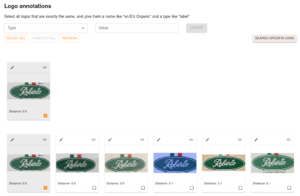Logo Annotation Guidelines: Difference between revisions
Raphael0202 (talk | contribs) mNo edit summary |
Raphael0202 (talk | contribs) No edit summary |
||
| Line 23: | Line 23: | ||
* The value should match one item in the associated taxonomy, otherwise it won't be used for prediction. The field value is lowercase before saving the annotation. | * The value should match one item in the associated taxonomy, otherwise it won't be used for prediction. The field value is lowercase before saving the annotation. | ||
* Use ''QR code'' type for QR codes, ''Packager code'' for packager codes (code surrounded by a circle), ''Brand'' for brand logos, and ''Label'' for label logos. | * Use ''QR code'' type for QR codes, ''Packager code'' for packager codes (code surrounded by a circle), ''Brand'' for brand logos, and ''Label'' for label logos. | ||
For labels and brands, logo annotations will update the product by adding the annotated label or brand. Please note that there is a 5 minutes delay between the annotation and the database update. | |||
Example (label): https://hunger.openfoodfacts.org/logos?logo_id=161643, here, we should add "Label Rouge" as value and "label" as type. | Example (label): https://hunger.openfoodfacts.org/logos?logo_id=161643, here, we should add "Label Rouge" as value and "label" as type. | ||
Revision as of 10:25, 28 December 2022
Other languages
/ français /

The annotation Web interface is available at: https://hunger.openfoodfacts.org/logos.
The goal of the annotation is to provide ground-truth labels that will be used to predict the label of unseen logos.
It is extremely important to provide quality annotations, otherwise, the predictions won't be qualitative.
If you're not sure of how you should annotate a logo, ask on Slack, in the #ai-logo-detection channel.
How to?
1. Open web interface: https://hunger.openfoodfacts.org/logos
2. Select logos to be annotated (click each desired logo with your mouse)
3. Fill value and type corresponding to the selected logos. Be sure to check that the value and type are correct before submitting the annotation :
- The value field should only be completed for "brand" and "label" types.
- The value should match one item in the associated taxonomy, otherwise it won't be used for prediction. The field value is lowercase before saving the annotation.
- Use QR code type for QR codes, Packager code for packager codes (code surrounded by a circle), Brand for brand logos, and Label for label logos.
For labels and brands, logo annotations will update the product by adding the annotated label or brand. Please note that there is a 5 minutes delay between the annotation and the database update.
Example (label): https://hunger.openfoodfacts.org/logos?logo_id=161643, here, we should add "Label Rouge" as value and "label" as type.
Example (brand): https://hunger.openfoodfacts.org/logos?logo_id=444915, here we should add "Rachel's" as value and "brand" as type. Please note there is not yet auto-completion for brand. Server-side, the value is transformed into a tag ("rachel-s") and matched against existing brands in the database. The brand logo annotation is used only if we find a match.
If more than one logo is visible on the crop, do not annotate it. A flag system should be available in the future to report them.
If the logo is truncated, annotate it anyway if it can still be recognized.
You can click on the blue link in the top-right corner of each logo card. It will open a new tab with this specific logo as a reference. It's really useful to find similar logos to annotate.
Query parameters:
- logo_id: the ID of the logo. If not provided, will be random.
- count: the number of results to display (default: 25). Useful to annotate many logos at once.
For instance, to display 50 results, use: https://hunger.openfoodfacts.org/logos?count=50
Common labels
Here is a list of common label names you will probably see: